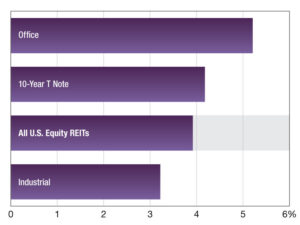Are Coworking Networks the Future of Office?

As the nation’s coworking space demand and supply show no sign of slowing down, the sector is more clearly refining itself. From color schemes and space configurations to food and beverage offerings, business models throughout the sector are beginning to resemble the hospitality and fast-casual dining industries.
Some operators are leaning into this idea, offering different types of spaces under separate, yet consolidated networks and brand offerings, akin to IHG Hotels or Dunkin. In October of last year, CoWorks, a coworking franchiser operating three separate brands, rebranded to become Vast Coworking Group. The franchise operates three distinct brands across more than 190 locations in 31 states and 10 Canadian cities.
And the results speak for themselves. Three of the five largest coworking operators work under a network offering, owned by Switzerland-based IWG. Combined, they opened 13 new locations in the third quarter of this year alone, CoworkingCafe reported. According to Mark Dixon, the company’s CEO, 95 percent of the company’s global location openings in 2024 were with local property owners and investors.
The consistency and revenue-generating reliability of the coworking networks not only benefit users and brands, but space operators as well. However, making these franchise models work is not without challenges.
A hotel for offices
The two biggest trends motivating the use of a network model are the omnipresence of hybrid work, as well as large companies’ plans to move their employees to flexible spaces. Given the sheer amount of diversity that these changes entail, from corporate satellite offices to suburban hybrid workers looking to break with the 9-to-5 routine, it doesn’t make sense to offer a one-size-fits-all brand offering for coworking spaces.
Christine Wyckoff, head of Americas flexible office services at Cushman & Wakefield, emphasizes that location decisions depend on where the occupiers are actually looking to work. “The hybrid worker has influenced where new coworking locations are opening, as they are choosing to work closer to home to avoid lengthy commutes,” Wyckoff told Commercial Property Executive.
Jason Anderson, president of Vast Coworking, compared this strategy to observations that Marriott and Hilton made with their hotels in the 1980s. “There may be instances where you’re going on a honeymoon and want luxury 5-star experiences, and there are others where you are going on a corporate meeting or you’re a consultant with a place to stay,” Anderson said. “It would not make sense to put a 5-star St. Regis (hotel) in a suburban area where you would put a Courtyard, but that does not mean that Courtyard is any better or worse. It’s a different product for a different crowd.”
For their part, Vast’s offerings include Intelligent Office, which provides a more customizable experience with private offices and conference rooms alongside business services including reception and mail services. These could appeal to companies expanding out of a satellite office. Venture X is the most traditional of the pack, combining a mix of private workspaces and collaboration areas, giving both individual employees and companies some versatility in how they utilize the space. Office Evolution is a mix of the two, offering scalable spaces within suburban locations, a favorite of individual office workers seeking shorter commutes.
READ ALSO: Coworking Spaces Surge Amid Changing Demand
IWG’s Dixon believes that part of this appeal is the result of greater autonomy on the part of employees and their higher-ups, relative to the teams that sign 10-to-15-year leases at downtown office buildings. “The decision about a company’s real estate needs is no longer solely a question for the real estate directors of organizations,” Dixon noted.
Plug-and-play
In addition to the operations element, coworking networks can also streamline the ability to open new locations at scale. Vast and IWG may have the technology, marketing, buying power and employee training to operate across the nation, but it’s the local entrepreneurs who get the businesses off the ground. Opening a new coworking space is just as much, if not more, of an investment for the local operator than it is for the franchisor.
The process is simple. IWG or Vast will research the area demographics, alongside office sector fundamentals such as pricing, rents, demand and occupancy. These determine the right type of space to build, as well as the optimal layouts and service offerings.
The day-to-day operations, management and ownership are left in the hands of the franchisees, who give the spaces the more personal, local feel in their interactions with tenants and customers, event programming and even decorations. Some may have previously been mom-and-pop coworking operators whose spaces could not compete with a network. “They know the building, they know the demand and they may even be clients of their own space,” Anderson said.
At the same time, franchising gives the local operators a leg up in setup, saving them both time and money, minus the risk of employee downturn or competition with other established brands. A franchise fee often covers many startup and employee training costs, while the franchisees will have immediate access to IWG’s or Vast’s space design and software offerings. All that is left to do is work with a landlord and broker for approving the space’s final build-outs. Just this month, a partnership between Vast and WeWork brought WeWork’s booking software to more than 75 Vast locations across 50 markets in the U.S. and Canada.
Compare this with a local operator’s struggles to get off the ground. “You don’t have to start from scratch,” Anderson said. “If you do, you have to build a logo, you have to convince the landlord to work with you when you have never done it before, you have to call all the furniture vendors to figure out which ones are the best, you have to organize the software, you have to build your own website, doing all of this without any accountability.”
All of this occurs while the location is not generating any revenue, while needing to build up a brand name. And this is all below marketing costs. “Our organizations give 2 to 3 percent of their revenue as a marketing fee, but a mom-and-pop may spend up to 20 percent,” Anderson said.
And it’s not even one location that the local operator has to compete with. “We offer greater flexibility and the choice to work where and when they wish, which is in stark contrast to other operators who only have a very small footprint,” Dixon said.
“At an Office Evolution, your key fob should work at the front door of every Office Evolution,” Anderson said. “If you’re a mom-and-pop, how do you compete with Anytime Fitness or Planet Fitness, which allows me to have access to every gym in the entire country at the same price that I could your gym?”
Often, a new Vast location opening is the result of a previous closure and sale.
Too good to be true?
In assuming much of the responsibility for operating a coworking space, franchisees often also take on much of the risk. While Spaces or HQ attach their brand name to a property, it’s up to the local operators to ensure that the location is consistently occupied.
But Anderson sees this as a net benefit, as a franchisee has a far deeper personal interest in a location’s success than employees of, say, a REIT. “A general rule of thumb in franchising is, who is going to do a better job, an employee or a franchisee?” He asked. “The franchisee who is pulling money out of their 401k or investing in a small business loan; they’re going to work very diligently to make sure that that location is successful.”
The post Are Coworking Networks the Future of Office? appeared first on Commercial Property Executive.




